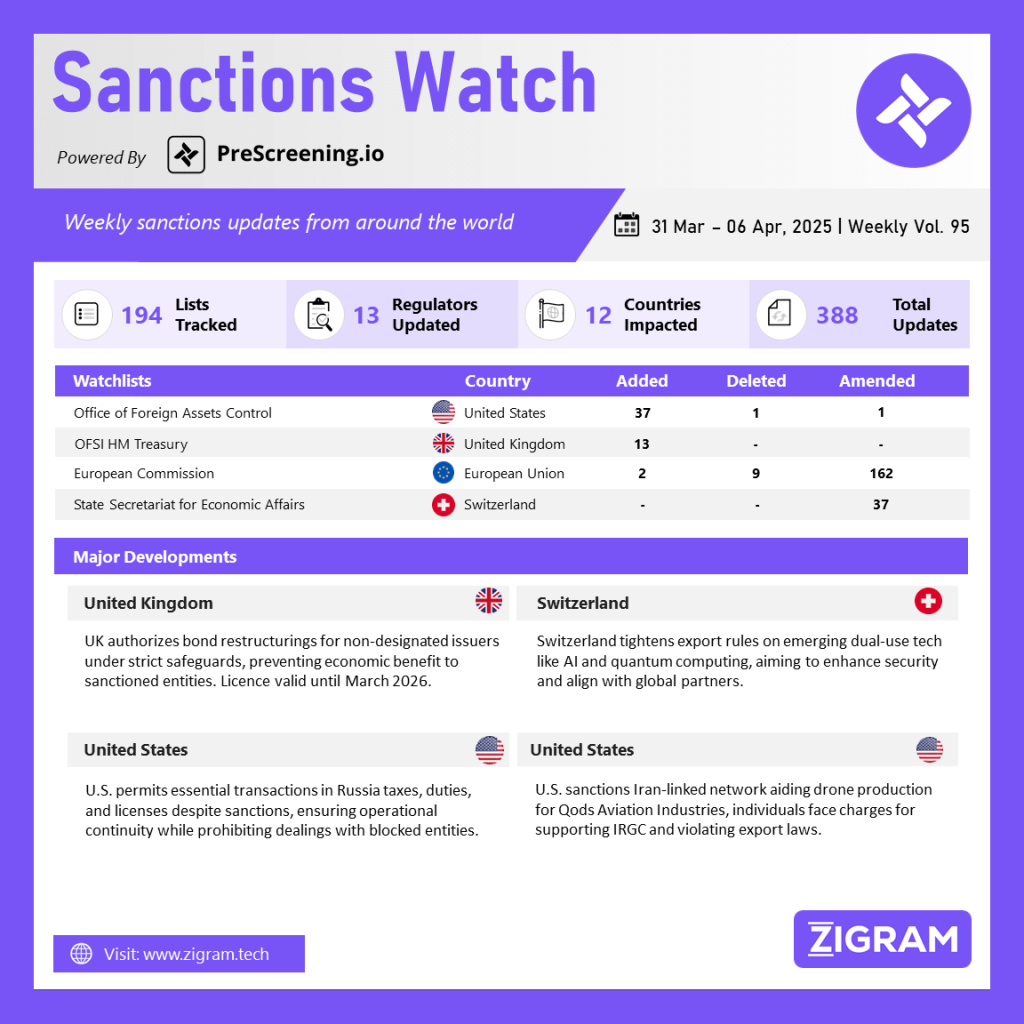Sanctions Watch Vol 95
In the latest edition of our Sanctions Watch weekly digest, we present significant updates on sanction watchlists and regulatory developments.
1. UK Issues Sanctions Licence Permitting Bond Restructurings with Conditions for Non-Designated Issuers
The UK’s Office of Financial Sanctions Implementation (OFSI), part of HM Treasury, issued General Licence INT/2023/2824812, authorizing specific bond-related transactions under the Russia (Sanctions) (EU Exit) Regulations 2019. The licence allows non-designated bond issuers to carry out bond amendments or restructurings even if they suspect that some of their bondholders may be Designated Persons, as long as stringent safeguards are followed.
Specifically, the licence permits such restructurings provided no funds or economic resources—or any associated rights—are made available directly or indirectly to any Designated Person. If any such person would have received benefits under normal circumstances, these must be frozen until the designation is lifted.
UK Persons and Relevant Institutions are also authorized to facilitate these transactions under the same conditions. Issuers must report to HM Treasury within 14 days of completing a transaction, detailing how they complied with the licence’s restrictions.
The licence is valid from 28 March 2023 to 27 March 2026, and all parties must retain records for at least six years. OFSI reserves the right to vary, revoke, or suspend the licence at any time.
2. Switzerland Introduces New Export Controls on Emerging Dual-Use Technologies Amid Global Tensions
The Swiss Federal Council approved an amendment to the Goods Control Ordinance (GCO), introducing new national export controls targeting dual-use goods in advanced technological sectors. This regulatory update, effective May 1, 2025, reflects Switzerland’s response to stalled multilateral export control negotiations and seeks to align its measures with those of key international trading partners.
The decision expands the list in Annex 2 of the GCO, which outlines dual-use items—goods, software, and technologies that can serve both civilian and military purposes—requiring an export license. The updated controls specifically address cutting-edge fields such as quantum computing, artificial intelligence, advanced semiconductor fabrication, and additive manufacturing.
Prompted by a Federal Council mandate issued in December 2024, the Federal Department of Economic Affairs, Education and Research (EAER) drafted the revisions to ensure Switzerland remains consistent with global export control regimes. The aim is to maintain national security, prevent misuse of sensitive technologies, and enable continued access to critical technologies for Swiss industry and academia.
The revised list will be made publicly available on the State Secretariat for Economic Affairs (SECO) website, reinforcing Switzerland’s commitment to responsible technology governance amid growing geopolitical uncertainty.
3. U.S. Treasury Renews License Allowing Routine Business Payments in Russia Amid Sanctions
The U.S. Department of the Treasury issued General License No. 13M, authorizing certain administrative transactions involving the Central Bank of Russia, the National Wealth Fund, and the Russian Ministry of Finance. The license replaces General License No. 13L and extends the validity of permitted transactions through 12:01 a.m. EDT on July 9, 2025. Under this license, U.S. persons and entities they own or control are allowed to pay taxes, fees, import duties, and receive permits, licenses, or tax refunds necessary for daily operations in Russia. These permissions apply despite broader prohibitions under Directive 4 of Executive Order 14024, which targets key Russian financial institutions.
However, the license explicitly excludes any debits to accounts held at U.S. financial institutions by the aforementioned Russian entities and does not authorize any dealings with parties blocked under the Russian Harmful Foreign Activities Sanctions Regulations (RuHSR). This regulatory move seeks to maintain compliance with U.S. sanctions while allowing companies to meet basic legal obligations in Russia, reflecting a balance between economic pressure and operational necessity.
4. U.S. Cracks Down on Iran’s Drone Supply Chain with Sanctions and Criminal Charges
The U.S. Department of the Treasury’s Office of Foreign Assets Control (OFAC), in coordination with the Department of Justice, announced sweeping sanctions against a procurement network supporting Iran’s unmanned aerial vehicle (UAV) program. The action targets six entities and two individuals across Iran, the UAE, and China involved in sourcing UAV components for Qods Aviation Industries (QAI)—a key manufacturer for Iran’s drone arsenal.
Sanctioned entities include Rah Roshd Company, which procured combat drone parts for QAI, and its leadership, Hossein Akbari and Reza Amidi, who now face criminal charges for violating U.S. export laws and supporting the Islamic Revolutionary Guard Corps (IRGC)—a designated foreign terrorist organization. Additional sanctions were imposed on UAE- and China-based intermediaries such as Infracom, Zibo Shenbo, and financial facilitators like Diamond Castle and Future Trends.
This marks the second major enforcement under President Trump’s National Security Presidential Memorandum 2 and reinforces Executive Order 13382 targeting weapons of mass destruction (WMD) proliferators. All U.S.-linked assets of the designated parties are blocked, and U.S. persons are prohibited from dealing with them. These coordinated actions aim to disrupt Iran’s weapons supply chain and curb its influence through proxy warfare and regional aggression.
Know more about the product: PreScreening.io
Click here to book a free demo.
Sanctions Watch is a weekly recap of events and news related to sanctions around the world.
- #USSanctions
- #UKSanctions
- #OFAC
- #RussiaSanctions
- #InternationalSanctions
- #GeneralLicense
- #SanctionsCompliance
- #OFSI
- #ExportViolations
- #ExecutiveOrder13382
- #FinancialSanctions
- #IranSanctions
- #DualUseTechnology
- #NationalSecurity
- #DroneSanctions
- #QuantumComputing
- #SemiconductorControls
- #ArtificialIntelligence
- #BondRestructuring
